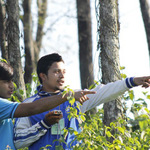
10-09-2015 - We “youth” are tired of being called the future.
We have a lot to offer in helping to solve the global issues of hunger, malnutrition, climate change and gender. We can be pioneers of development and agents of change. But young people generally have inadequate access to information, knowledge and decent jobs, land, and financial services and the opportunity to contribute to development policies.
The creativity and capacity of young people must be promoted in rural development. Forests are an integral part of our ecosystem and have an important role in solving some of the present
global food and environmental issues. By 2050, the world’s population will reach 9.1 million 2050, and food production will need to increase by 70%. We reside in, depend on and use the resources of the world’s forests. An integrated, sustainable approach to managing forest and agriculture landscapes is the way forward in meeting the growing food demand.
The development agenda of developing countries needs to put youth at the center involving them in decision making. The traditional top-down development approach needs to be turned around to be more participatory, involving rural youth in a bottom-up approach. It’s important that young people are included in research, policy and practices around sustainable forest and landscape development.
Youth today are very much concerned about the environment and are increasingly attracted towards green business model. In recent years, many young people have moved to the cities in search of a better life, but an increasing number are also staying in villages to become rural agro- and forest-based entrepreneurs. This trend needs the support and investment of governments, research organizations, and the private sector, to create a favorable environment for working and investing in villages.
Today’s world is more interconnected than ever and here is where young people are most active. Rural youth are involved in increasing awareness about sustainable landscape management in the community and are becoming more interested in research for development in sectors related to forestry, landscape management and climate change. Such enthusiasm needs to be supported through better forestry education, and involving them in research, capacity building, technological transfer and in decision making.
The gathering of leading forestry organizations, environmentalists, researchers and experts in Durban is the right place to put forward these issues in the context of sustainable forest management. Let’s use this opportunity to bring forward youth perspectives for sustainable living.



